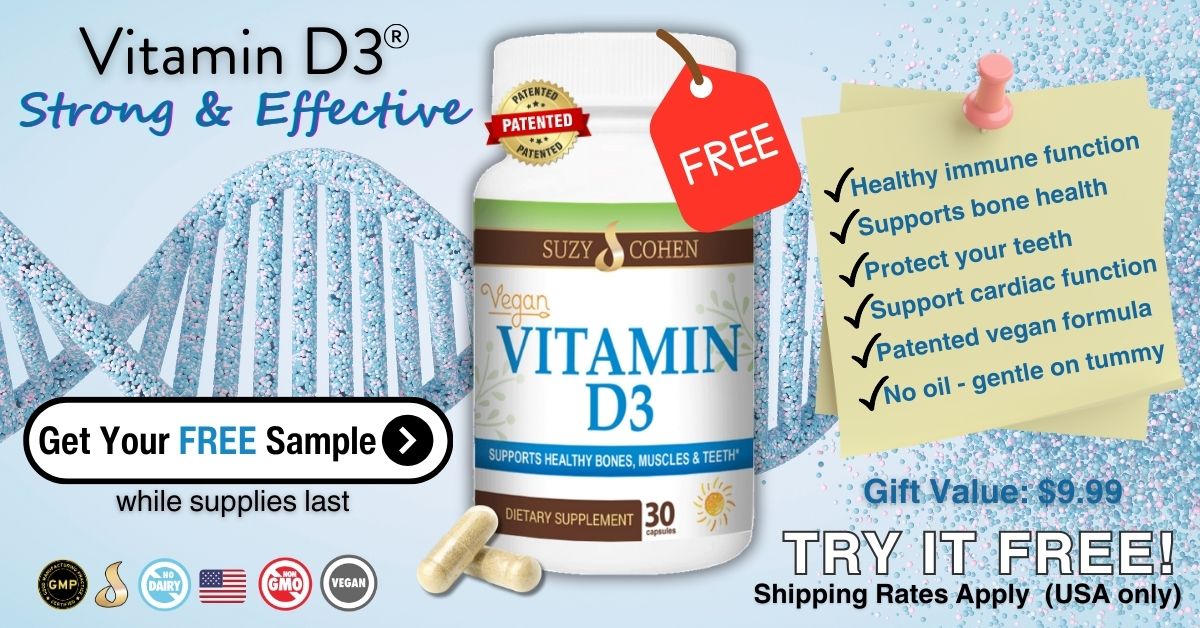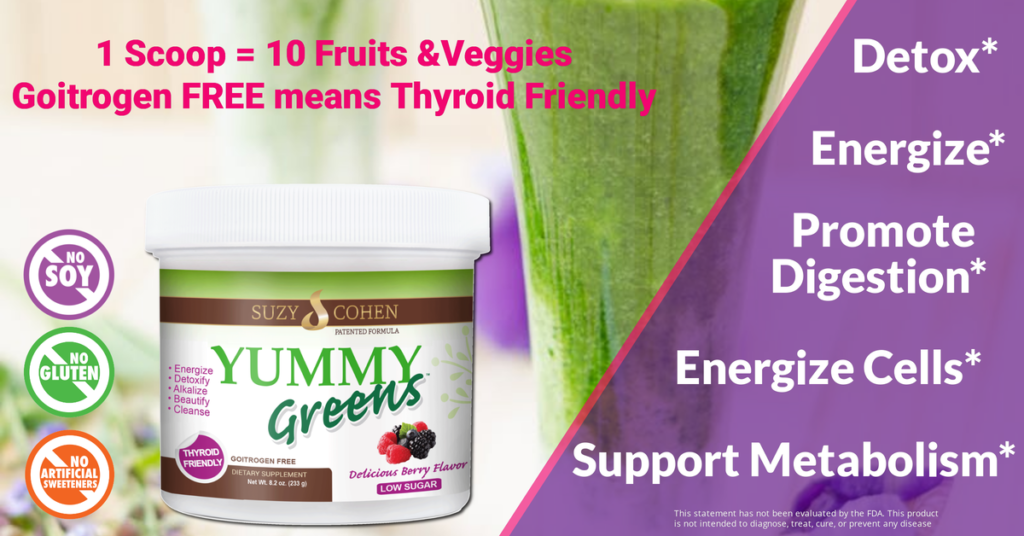What's On This Page?
ToggleIn the tapestry of health, energy, and joy, our thyroid plays the role of an unsung hero, quietly orchestrating all of these metabolic processes. It keeps us warm and comfy, helps us think, and makes us happy instead of sad. Thyroid hormone is also a fat burner!
Yet, when the harmony of our body is disrupted, particularly by an iodine deficiency which can cause symptoms of hypothyroidism, it’s essential to look at how that might have occurred. Do that before you take any more pills or treatments because sometimes you do it to yourself. In other words, there are medications that you could be taking that cause your hypothyroidism by suppressing iodine absorption.
By the way, while I’m talking about hypothyroidism, another blog I wrote came to mind. It’s about a weird taste that you might get in your mouth. It’s called dysgeusia, and it happens in people with thyroid illness. You can read more in, Sensory Surprises: Dysgeusia and Its Assocation With a Dozen Medications.

The goitrogenic effect of medications (and/or foods and supplements) can be so severe that it causes a goiter. In other words, causes your thyroid gland to enlarge (termed goiter) in an attempt to capture more iodine from the bloodstream!
Goitrogenic medications and foods can harm a person with unknown illness, and that’s the focus of my blog today. I’m a pharmacist, so I’m a drug information specialist. I know about these compounds and want to warn you about some today.
Among the thousands of drugs available to us today, certain ones stand out – the goitrogenic medications – not for their healing properties but for their potential to impede thyroid function, and cause hypothyroidism in a person that is otherwise healthy. Today, we’ll uncover six such goitrogenic medications together, and I will also provide their brand and generic names so you can see if you take them.
Meet the Goitrogenic Medications
I will elaborate on each of these goitrogenic medications (actually one is food-related!) so just scroll down:
1. Lithium
2. Amiodarone
3. Interferons
4. Sulfonamides
5. PTU
6. Thiocyanates
This may shed light on why you started to feel worse and worse in some ways, after beginning a medication that helped you with another problem.
1. Lithium: The Double-Edged Sword
Generic Name: Lithium Carbonate
Brand Names: Eskalith, Lithobid
Lithium carbonate, a mainstay in the treatment of bipolar disorder, has a dark side for the thyroid, acting as a goitrogen that can impair hormone synthesis. Because it is a goitrogen, it suppresses iodine absorption. This interference can lead to hypothyroidism, an enlarged thyroid gland (goiter), and even autoimmune Hashimoto’s thyroiditis. With this condition, avoiding stress is imperative. Cortisol will make it worse. Read my other blog, How Stress and Cortisol Impact Hashimoto’s and Graves’ Disease.
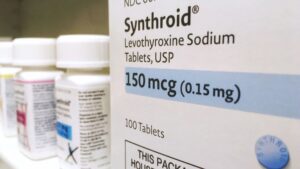
For those people under lithium therapy, regular thyroid function monitoring is a must, and probably a thyroid replacement pill such as Synthroid® or Armour Thyroid® or others. This ensures your metabolism plays properly without interruption, while the lithium stabilizes your mood.
It makes sense that these two medications would be prescribed together, but of course, I am a pharmacist not your doctor, so speak to your own doctor to get an opinion, take a Thyroid Profile test, and add on the autoimmune testing for it, and finally, consider a trial course of low dose thyroid medication. That’s the only way to really know.
2. Amiodarone: The Iodine-Rich Rhythm Disruptor
Generic Name: Amiodarone
Brand Names: Cordarone, Pacerone
Amiodarone, used in the battle against arrhythmias, is laden with iodine, a critical element in thyroid hormone production. It is not actually a goitrogen. However, in this case, each 200mg pill provides 75mg of iodine! That’s too much and as you know too much of even a good thing becomes a major problem! This potentially leading to both hypothyroidism and hyperthyroidism. Weird, I know, but the mechanism by which this occurs is as follows:
Hypothyroidism: The excess iodine you get from the drug amiodarone can temporarily block production of thyroid hormone production because your body sees a lot of it (so it just backs off basically). It’s called the Wolff-Chaikoff effect. It might go on for a long time, or swing back and forth with hyperthyroidism as your body’s thyroid thermostat tries to figure out what’s going on every day that you take that pill! As a pharmacist, I’ve never recommended amiodarone for this reason. See below for symptoms.
Hyperthyroidism: Amiodarone can also lead to hyperthyroidism where the drug directly causes damage to the thyroid gland, leading to the release of stored thyroid hormones. This causes a transient increase in thyroid hormone. See below for symptoms.
It’s very complex, I just would say to avoid this drug if you have thyroid disorders, and naturally speak to your physician for proper monitoring and alternatives for your heart. In short, the massive iodine imparted from this drug can confuse your thyroid hormone production, disrupting its normal rhythm and causing major (and pretty sudden) side effects in some people.
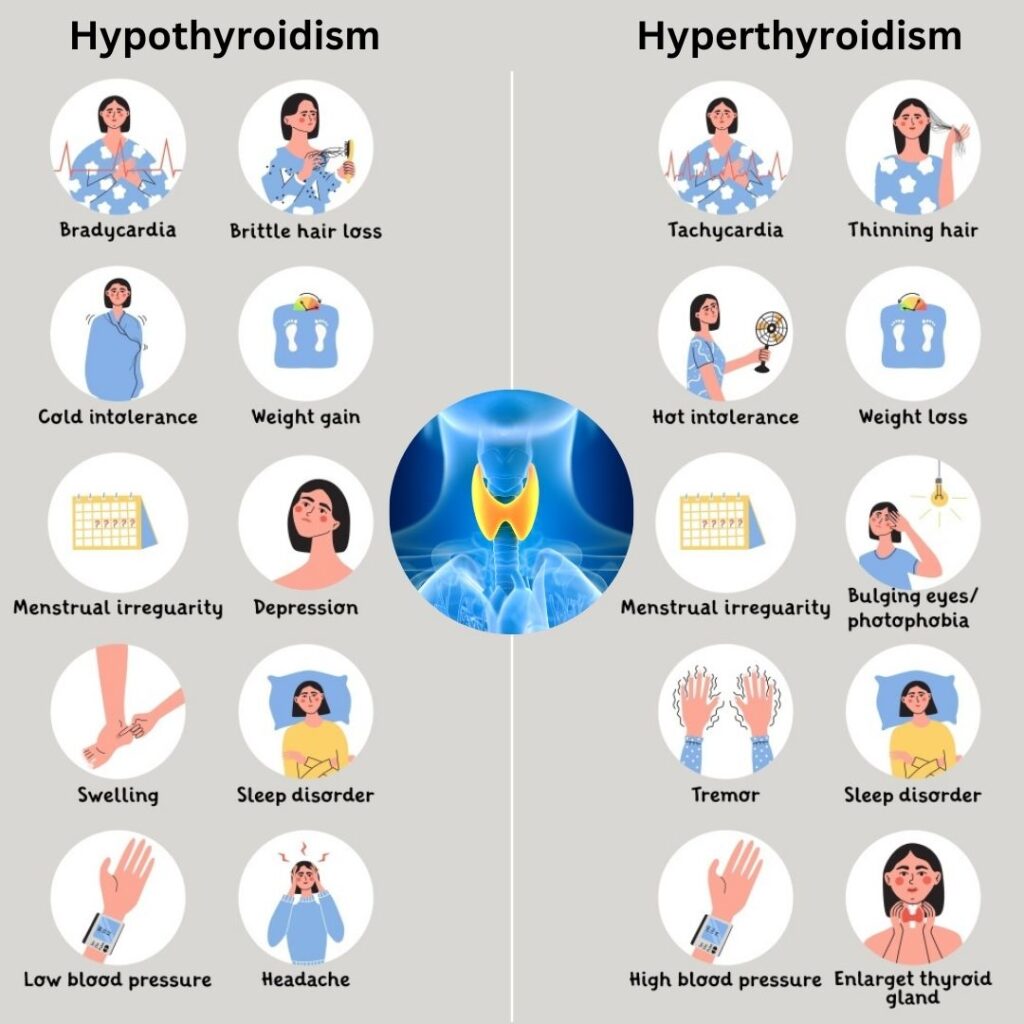
3. Interferons: The Immune System’s Mixed Message
Generic Names: Interferon-alpha (Intron A), Interferon-beta (Betaseron)
Brand Names: For Interferon-alpha – Roferon-A® and for Interferon-beta – Rebif®
Interferons are proteins used to boost the immune system against cancers and viral infections such as hepatitic C, multiple sclerosis and more. This category of drugs can sometimes send mixed signals to your thyroid gland. They’re not literally goitrogenic in the traditional sense of inhibiting thyroid hormone synthesis or competing with iodine uptake in the thyroid gland.
But I’m listing them here because by stimulating your immune response, interferon drugs may cause thyroiditis and hypothyroidism in some people, even autoimmune thyroiditis. Speaking of hypothyroidism, you might want to take 5 minutes to read my blog entitled, 5 Signs of Thyroid Imbalance and How to Address Them Naturally.
The latter is an inflammation of the thyroid gland which can cause it to dump out all of its thyroid hormones that were previously stored in the gland. That causes sudden hyperthyroidism symptoms for a while (transient symptoms), followed by hypothyroidism.
The impact of interferons on the thyroid is thought to be mediated through immunomodulatory effects rather than direct goitrogenic actions. Given the roller coaster of effects, I’d advise people getting interferon to very closely monitor thyroid function, and use the lowest dose possible. Your specific treatment may require medications such as thyroid hormone replacement therapy and/or dietary supplements to naturally balance the system.

4. Sulfonamides: Antibiotics and Diabetes Drugs
Generic Names: Sulfamethoxazole plus Trimethoprim as brands Bactrim® or Septra®
Generic Names: Sulfasalazine which goes by Azulfidine®
Generic Names: Glyburide which goes by Glynase® or Diabeta® (those brand names have been discontinued – only the generic “glyburide” is available now. Also, the discontinued tolbutamide (Orinase®) would be considered a sulfonamide-based drug.
While sulfonamides are antibiotics used to combat bacterial infections, their role as goitrogens emerges from their ability to inhibit thyroid hormone synthesis. In this category, you may have encountered
SULFONAMIDE drugs inhibit TPO which is the enzyme that makes thyroid hormone. It also displaces thyroid hormone from their binding proteins. That’s not good. It’s like a carjacking of sorts… the thyroxine is traveling to your cells in the bloodstream on “TBG thyroxine-binding globulin”, and the sulfonamide is a bully. It goes and knocks it off the TBG… essentially pulling it out of the car against its will!
What this does is make the thyroid hormone free, instead of bound to a protein, and causes high and low swinging of hormone activity. As far as symptoms go, it can look like a panic attack, agitation, restlessness, mood instability, and tearfulness, all within hours or days. You may think you’re going crazy.
Although less commonly associated with thyroid dysfunction than other medications on this list, sulfonamides are listed here because of the potential impact they can cause on your body.
Some of you may have Crohn’s disease or colitis and require sulfasalazine. There’s more. I think because many men and women take this drug for chronic infections such as UTIs, Lyme, gonorrhea, inflammatory bowel disease and more, that it warrants some attention. This is the case particularly in people with pre-existing thyroid conditions and require a sulfonamide.
Those of you with diabetes who take glyburide (and I hope you don’t because those drugs have a lot of side effects), but if you do, you should know that this drug may contribute to the development of hypothyroidism. Tolbutamide is an old, old drug and not even around anymore. Those first-generation sulfonamides have been discontinued due to serious side effects, especially on the heart. Are you thinking what I’m thinking? I That the damage to the heart induced by major thyroid hormone shift played a big role in their discontinuation! Here’s a STUDY.
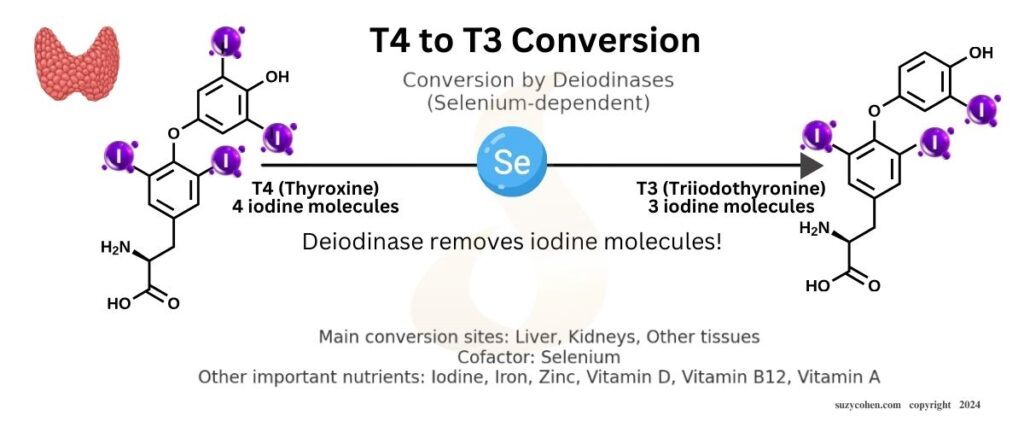
5. Propylthiouracil (PTU): The Treatment for Hyperthyroidism
Generic Name: Propylthiouracil
Brand Names: Called by its generic name, PTU.
Propylthiouracil (PTU) is not an unintended disruptor, but rather fully intended! It’s prescribed for symptoms of hyperthyroidism, which can occur if you take too high of a dose of your thyroid medication for hypothyroidism, or it can occur if you have Graves’ disease. Either way, PTU plays a pivotal role in slowing down the thyroid gland’s overproduction of hormones.
So unlike the other drugs I’ve discussed here, PTU’s goitrogenic action is deliberate, and it blocks your TPO enzyme (thyroid peroxidase). This enzyme is needed to make thyroxine T4 and you can’t make thyroid hormone without it! So when PTU blocks thyroid hormone synthesis it calms down an overactive thyroid gland. If a normal person takes it, they will become hypothyroid, but if a hyperthyroid person take it, they will feel well again.
PTU’s ability to interfere with thyroid hormone synthesis highlights its potent goitrogenic effect,which is why I’m listing it. I like to be complete.
6. Thiocyanates: Mainly cruciferous vegetables
Generic Name: Not applicable
Examples: Broccoli, cauliflower, mustard greens, Brussels sprouts, cabbage
Thiocyanates, though not a medication but a component found in cruciferous vegetables. You can read my blog, The Case Against Kale. This is just a category of compounds found in the diet.
Ages ago, like in 1930, potassium thiocyanate was being hailed as the best treatment for hypertension. It is not used anymore because it is not that safe. That said, potassium supplements do help with hypertension. But back then “potassium thiocyanate” was used as an antihypertensive treatment and it is goitrogenic. I think it deserves mention and here’s a JAMA abstract from 1930 about it.
Some of you don’t use my Yummy Greens® which are goitrogen free. And you use some of the other popular green superfood powders – to this I say BE CAREFUL and BE WARNED. You are drinking scoopfuls of goitrogens which could interfere with iodine uptake.
This interference can lead to a goiter, and/or hypothyroidism, especially in people with underlying thyroid issues. It’s because the grasses/fruits/vegetables are acting like goitrogenic medications. Awareness that alfalfa and other greens are goitrogenic is critical. You might want to stop those brands for a few weeks and see if you feel better.
My literary agent told me I changed her life for the better with this little tidbit of information.
She has Hashimoto’s and was getting flare-ups and all kinds of problems on her green drink. I told her to switch to mine, and she said I changed her life!
Here Are the Solutions to Goitrogenic Medications
Before I list options of how to counter the thyroid hormone imbalances, I think it’s important to say that the ultimate solution would be to change the medication category if that’s possible. Sometimes it is, you’d have to ask your doctor.
I wouldn’t forgo treatment for a disease because of anything here, I would just find a different medication that works for you, that doesn’t interefere with your thyroid gland, that’s all I am saying. This is what we have physicians for,right?! They have a complete list of other meds that you can try, that do the same job without interfering with thyroid problems. Now, here are some ideas for you to ponder and discuss with doc.
These may or may not be right for you. It depends on if your thyroid hormone is high or low, or if you have autoimmune or not… there is not a simple fix for each drug above or I would have gladly listed it for you. The following are mere considerations that might help some of you on your path to balance:
- Iodine supplementation: Considering your physician’s approval, supplementing with iodine could be beneficial for you. Doses vary from 6.25mg to 50mg daily. You’d have to monitor yourself to know what you need. And you may not even need this if you are HYPERthyroid! Be careful with iodine. Moreover, there’s a nutritious path to enhancing your iodine levels. Let’s talk about that next.
- Iodine-rich foods: For a natural boost of iodine, look towards the ocean: Seaweed varieties like kelp, kombu, and nori are excellent choices, as well as iodine-rich salt.
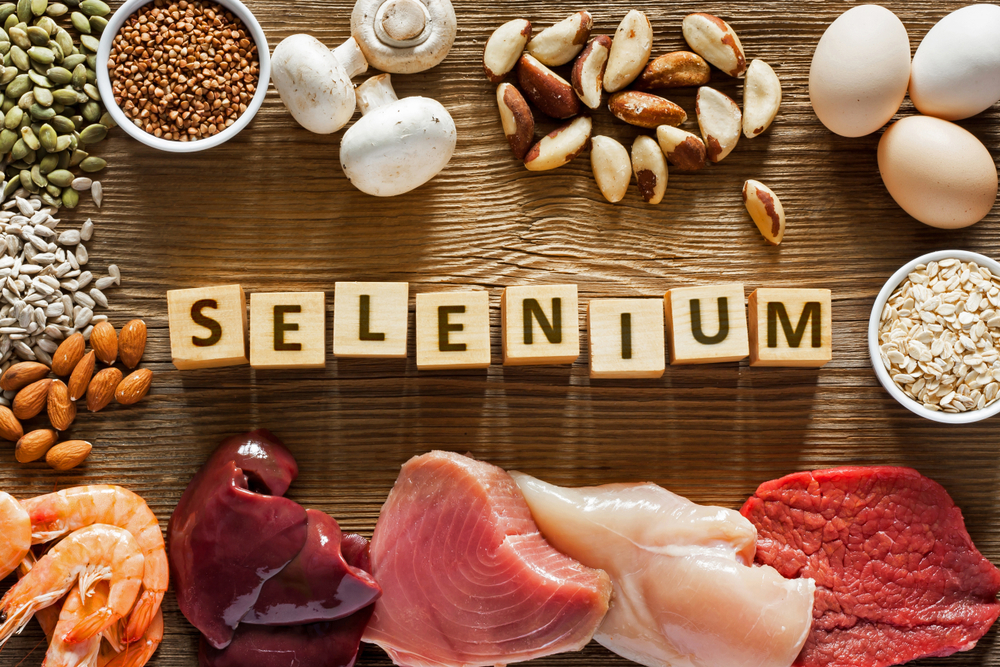
Foods High in Selenium - Selenium supplementation: You can also supplement with selenium. By boosting your intake of both iodine and selenium, you might find the balance you seek. A doctor can tease through all this with you. Usually, the dose is something like 100 – 200 mcg daily taken in the morning or divided doses (but not near bedtime).
- Selenium-rich foods: As for selenium, which plays a crucial role alongside iodine, you can find abundant sources in just 4 or 5 Brazil nuts each day, as well as various fish, meat, sunflower seeds, tofu if you like soy, baked beans, Portobello mushrooms and cheese. These foods can support your thyroid function by providing a little bit of selenium in each bite!
- If you take a green superfood drink each day for detox, don’t take one that is full of goitrogens. I’d say 99.9% of those on the market (even the very popular ones) are loaded with it, and that’s bad for your thyroid. If you like those fruit and veggie superfood drink mixes, and you have a thyroid condition, consider my 100% goitrogen-free Yummy Greens® because it is thyroid-friendly and supports detoxification, ATP production, and GI health.*
Conclusion
For those of us on the journey of thyroid health, understanding the potential impact of these goitrogenic medications is not about fear but about empowerment. It’s about making informed choices and fostering a dialogue with healthcare providers that places your thyroid health at the forefront.
Remember, the goal is not to avoid these medications if they are necessary for your health but to approach them with knowledge and awareness, ensuring your thyroid, that unsung hero, continues to conduct its symphony of metabolic processes in harmony.

Suzy Cohen, has been a licensed pharmacist for over 30 years and believes the best approach to chronic illness is a combination of natural medicine and conventional. She founded her own dietary supplement company specializing in custom-formulas, some of which have patents. With a special focus on functional medicine, thyroid health and drug nutrient depletion, Suzy is the author of several related books including Thyroid Healthy, Drug Muggers, Diabetes Without Drugs, and a nationally syndicated column.

